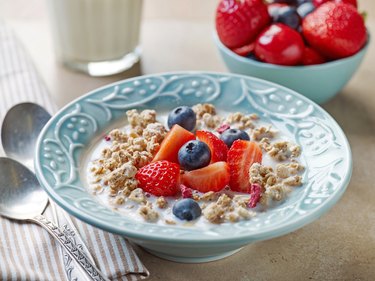
A complex system of hormone-producing tissues carefully regulates many of your body's essential functions. Called the endocrine system, it includes specialized beta cells in your pancreas that make insulin, the hormone partly responsible for regulating your blood glucose. Insulin signals your liver, muscle and other tissues to take in glucose, lowering its level in your blood. Certain foods can affect how well or poorly beta cells function to keep your blood glucose in a healthy range and help you avoid health problems.
Beta Cells and Insulin Demand
Video of the Day
More than 25 million Americans have diabetes, with more than 90 percent having Type 2 diabetes. In this disorder, the body responds poorly to insulin, a situation called insulin resistance in which beta cells produce more and more insulin in order to reduce blood glucose; these overworked beta cells finally become exhausted and produce little or no hormone. Research suggests that wornout beta cells might be able to recover or regenerate, but more work is still needed to clarify this possibility. You can help support the health of your beta cells by eating mostly foods that allow blood sugar to rise slowly after a meal, while avoiding foods that cause a rapid rise in blood sugar and a high demand for insulin.
Video of the Day
Healthy Carbohydrates
MedlinePlus says that about 50 to 60 percent of your daily calories should come from carbohydrate, and choosing complex, high-fiber carbs can lessen stress on your beta cells. Fiber adds no nutrients to food, but it can slow uptake of glucose into your blood, potentially lowering your body's demand for insulin after you eat. The American Diabetes Association recommends choosing whole-wheat breads, pasta and baked goods, brown or wild rice, whole oats and quinoa often. When buying processed or baked foods, opt for those with whole-grain flour as ingredients instead of products made with white, refined flour.
Carbs to Limit
Unlike fiber-rich carbohydrates, your body breaks down simple carbs almost immediately, so they are absorbed rapidly, raising blood sugar quickly. Also called simple sugars, these carbs include sucrose, or common table sugar. Sucrose is added to many sweetened foods, such a candies and sodas, and is the main sweetener in many cakes, pastries and ice cream. To minimize stress on beta cells, limit your intake of these sugary, sweetened foods, using them only as occasional, special treats. Other simple sugars include galactose, in dairy products, and fructose, the main sugar found in fruits. Most fruits are also high in fiber that slows glucose uptake -- examples include apples, pears, bananas and berries. Opt for whole fruits, choosing frozen or canned varieties without added sugar.
Other Foods
Keeping your body weight in a healthy range can lessen your risk of beta cell problems that may lead to Type 2 diabetes. Limit your intake of fat to less than 30 percent of your total calories, and eat few foods that are high in saturated fat, such as fatty meats and full-fat dairy products. MedlinePlus recommends eating every four to five hours, never skipping meals and keeping portions sizes only large enough to satisfy your hunger. To determine your ideal body weight and help develop the best diet plan for you, talk to your doctor or a registered dietitian.
- Diabetes.co.uk: Insulin
- American Diabetes Association: Fast Facts -- Data and Statistics About Diabetes
- Vanderbilt University: Diabetes Researchers Track Cells’ Ability to Regenerate
- MedlinePlus: Diabetes and Meal Planning
- Harvard School of Public Health: Fiber
- American Diabetes Association: Grains and Starchy Vegetables
- American Diabetes Association: Fruits
- Iowa State University Extension: Carbohydrate
- American Diabetes Association: Making Healthy Food Choices
Is this an emergency? If you are experiencing serious medical symptoms, please see the National Library of Medicine’s list of signs you need emergency medical attention or call 911.